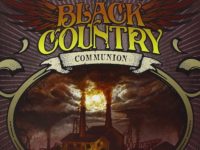The pity of it, really, is how perfectly named this album is. See Afterglow, a thunderous delight, arrives just as Black Country Communion appears to be falling apart. It’s a shame.
A shame because there aren’t enough bands playing this kind of straight-ahead, no-bullshit rock anymore. It’s a record that doesn’t bother speaking to your head — only your heart. Or maybe some place lower.
A shame because, for guys like drummer Jason Bonham (always, it seems, toiling in the lengthy shadows of his famous father) and vocalist/bassist Glenn Hughes (who’s been in legendary bands, but always as a late add-on), Black Country Communion seemed to be a ticket-punching pathway to establishing their own legacies — separate from anything that came before.
A shame because guitarist Joe Bonamassa, as prolific as he no doubt is, rarely sounds this unkempt and bluntly honest, this in the moment. And Derek Sherinian? Well, the keyboardist simply couldn’t be more underrated.
So, you put on Afterglow, and Hughes’ “Big Train” comes rumbling at you like a sparks-throwing, out-of-control railway car — one that’s gaining fast. Hughes, even at this advanced moment in his own career, is in complete control of the lyric, Sherinian is adding these portent-filled textures, Bonham is hitting the skins like they stole something from him, and then Bonamassa steps forward with a boiling, furiously inventive solo.
The band-written “This is Your Time” unfolds with a similar menace, while their “Midnight Sun” opens with a tactile, Who-like bombast before settling into a squalling groove. Hughes’ “Confessor” boasts a ear-melting propulsion, while their “Cry Freedom” stirs in some of the bluesy grit that marks Bonamassa’s tandem work as a solo artist.
Wait, these guys are breaking up — reportedly the result of a disagreement with the too-busy Bonamassa over touring behind this release? A shame.
Perhaps in keeping, Hughes took a more active role in the construction of this, Black Country Communion’s third studio release. His “Dandelion” and “The Circle” illustrate both the brawny toughness and the ease with a sizzling anthematic balladry that Hughes can bring to any project. Bonham, meanwhile, was the principal composer on “Common Man,” and his polyrhythmic asides show an interesting complexity that’s far beyond your typical heavy-metal basher.
When Black Country Communion settles into a series of ruminative thoughts on Hughes’ title track, however, it’s almost as if the band’s looming demise had already become clear — even back when they were putting Afterglow together. “So let me go!,” Hughes finally squeals, and there is a sad sense of finality.
It’s not just a shame. It’s a crying damn shame.
Click here to purchase …
- Nick DeRiso’s Best of 2015 (Rock + Pop): Death Cab for Cutie, Joe Jackson, Toto + Others - January 18, 2016
- Nick DeRiso’s Best of 2015 (Blues, Jazz + R&B): Boz Scaggs, Gavin Harrison, Alabama Shakes - January 10, 2016
- Nick DeRiso’s Best of 2015 (Reissues + Live): John Oates, Led Zeppelin, Yes, Faces + others - January 7, 2016








Merely an opinion here. Frankly I think Bonamassa is making a large miscalculation. His apparent mastery of the genre belies the fact that this sort of music is what he always loved. Here is his chance to become a legend. He should set aside his other commitments and stay with this. At least for a few tours and several more CD’s to see where it takes him. i Think this outfit would be huge given some significant touring. Of course it’s a tough road but a prerequisite to becoming a legend on a scale far exceeding what he can do as a soloist. This band like all great rock bands is the sum of it’s parts.